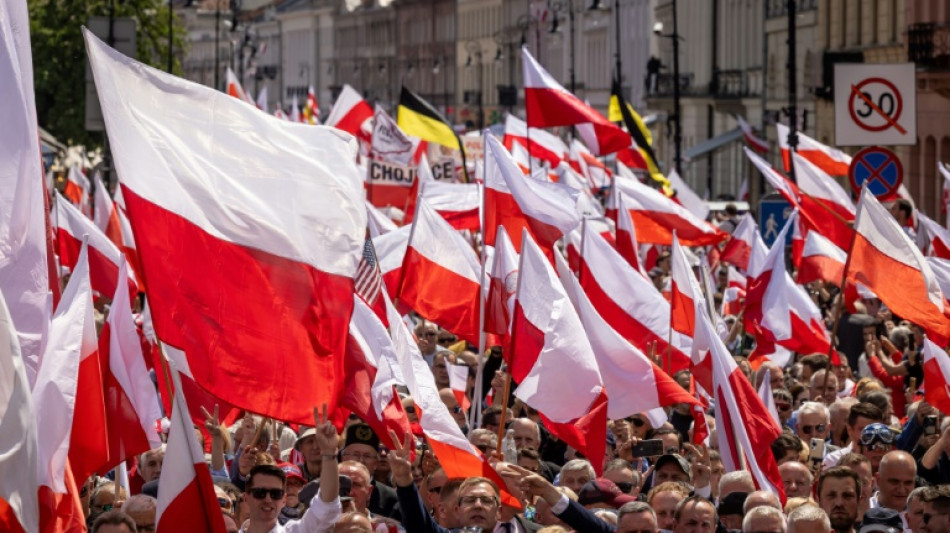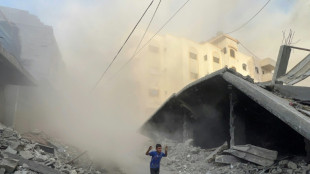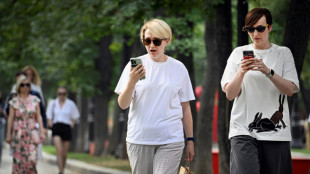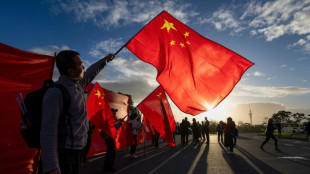

'Hurt': Ukrainians in Poland worried by rise of nationalists
For several months, Halyna Muliar watched Poland's presidential campaign from home in Poznan, worried as candidates swerved further to the right and increasingly aimed nationalist slogans at Poland's 1.5 million Ukrainians -- war refugees and economic migrants.
The 58-year-old arrived in Poland weeks before Moscow's 2022 invasion of Ukraine and recalled, with emotion, the huge solidarity from Poles when an evacuation train from her hometown of Mykolaiv arrived with her daughter and other refugees.
But three years later, anti-Ukrainian rhetoric is part of mainstream Polish politics.
This weekend, Poles elected as president nationalist Karol Nawrocki, who throughout his campaign questioned the rights of Ukrainians in Poland.
"So much has changed," Muliar told AFP in Warsaw, where she had come from Poznan in the west to pick up a residency card.
"I'm worried by everything that was said during the campaign."
Nawrocki claimed Ukrainians "cause problems in hospital queues" and "should not live better than Poles", also accusing Kyiv of being ungrateful to its allies -- all arguments often used by the Polish far right.
His rival, Rafal Trzaskowski, the pro-EU presidential candidate, had urged people not to give into "Russian narratives" about Ukraine.
But -- in a failed bid to win far-right votes -- he still said some benefits paid out to Ukrainian refugees should be cut.
For Muliar, the mood in Poland has seriously worsened.
"First, it started with the documents, with the waits getting much longer," she told AFP.
Many Ukrainians have experienced longer bureaucratic procedures to obtain documents legalising their presence in Poland.
Then, she noticed social media was so full of anti-Ukrainian content she preferred not to open it.
Before long, she was the victim of xenophobic comments in shops "to which I just close my eyes".
She is not alone.
Ukrainians in Warsaw who AFP spoke to -- refugees and migrants who have been living in Poland for years -- were alarmed by the unprecedented hard-right tone of the campaign.
"The damage has been done," said Olena Babakova, a longtime observer of Polish-Ukrainian relations and of Poland's Ukrainian community.
- 'Took away hope' -
While the theme of migrants has dominated election campaigns in the conservative Catholic country for years, Babakova said this "for the first time became strictly directed against Ukrainians".
Nationalist Nawrocki has often raised 20th-century grievances between Poland and Ukraine.
The pro-EU camp also flirted with that rhetoric, which Babakova said "took away hope".
She predicted the people worst affected by the trend would be Ukrainians working in the service sector -- mostly women who have the most contact with Poles and "paradoxically, really want to integrate in Polish society".
Olga Klymenko is one of them.
She is one of the one million Ukrainian refugees in Poland and works in a hotel.
She fled Russian occupation in 2022, escaping Ukraine's city of Izyum under fire through Russia before obtaining asylum in Poland.
"It hurts and worries me," she told AFP. "It's hard to know what tomorrow will bring."
Like many, she worries about her status in Poland.
There is much uncertainty among refugees over the future of legalisation processes.
"My house is destroyed. If there is some pressure from Poland, I have nowhere to return to," Klymenko explained.
Se said she was waiting to see what kind of president Nawrocki would turn out to be.
The role of head of state is largely ceremonial in Poland but the president can veto government law.
Nawrocki's victory has boosted the chances of a far-right win in the 2027 parliamentary elections.
"If there are some laws and the president's programme is not in favour of Ukrainians, then I don't know what we'll do," Klymenko said.
- 'From the top' -
Poland's economy and ageing population are heavily reliant on a Ukrainian workforce.
But Ukrainians who have been living in Poland for years have also been unnerved by the election campaign.
Yulia Melnyk, who has been in Warsaw for seven years, was convinced the negative sentiment had been whipped up "from the top".
"It's convenient for politicians to use this kind of topic," the transport worker said.
She said she had seen "a lot of hate" on the internet but not, so far, "in real life".
But she admitted: "I am worried, and my family in Ukraine is worried that there will be hate towards Ukraine from the authorities themselves."
Ukrainian cook Serhiy, who has lived in Warsaw for six years, hoped the rhetoric was limited to a heated pre-election period.
The 28-year-old is also waiting to see what Nawrocki would be like in power.
"I hope he will focus less on populism and more on real problems," he said.
E.Rizzo--GdR



